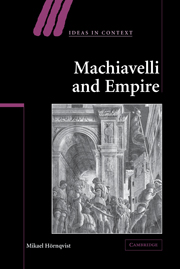Book contents
Conclusion: cui bono?
Published online by Cambridge University Press: 22 September 2009
Summary
When television has shown a fine picture and explained it with a brazen lie, idiots believe that everything is clear. The demi-elite is content to know that almost everything is obscure, ambivalent, “constructed” by unknown codes. A more exclusive elite would like to know what is true, hard as it is to distinguish in each particular case, despite all their access to special knowledge and confidences. Which is why they would like to get to know the method of truth, though their love usually remains unrequited.
Guy DebordMachiavelli's theoretical work resembles a Florentine Renaissance palazzo in its unique mixture of sophistication and self-imposed austerity. The difficulty in interpreting him is to no small extent due to the fact that his texts, openly or obliquely, simultaneously operate on several different levels, of which at least three can be distinguished here. The first, and the most widely recognized, level is that of principle, or theory. Machiavelli's writings are replete with generalizing statements, rules, axioms, and maxims that taken together form the core of his realist theory of political action, which in many quarters has earned him the title of the founder of modern political science. Second, there is the level of ideology. As recent scholars have been able to demonstrate, and as we have seen in the course of this study, Machiavelli's work draws on, and engages, many of the main themes of classical and Renaissance political thought and contemporary Florentine political debate.
- Type
- Chapter
- Information
- Machiavelli and Empire , pp. 264 - 290Publisher: Cambridge University PressPrint publication year: 2004



